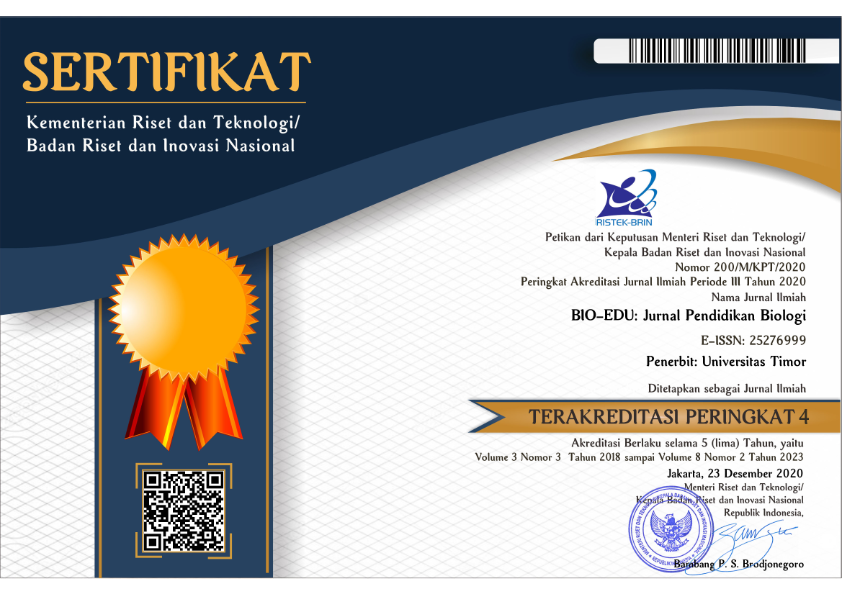Development of an Islamic Integrated Biology E-Module on Class XI High School Excretory System Material to Empower Students' Critical Thinking Skills
DOI:
https://doi.org/10.32938/jbe.v9i2.6575Keywords:
critical thinking, e-module, excretion system, Islamic integration.Abstract
This study aims to develop an Islamic integrated biology e-module on the excretory system material for grade XI high school to empower students' critical thinking skills. The product is developed using a 4-D development model (define, design, develop, and disseminate). The instrument used is a questionnaire. The research subjects comprised 30 class XI IPA students from MA Darul Ulum Semarang. Data collection was conducted through interviews, observations, documentation, and questionnaires. The data were analyzed using descriptive analysis and qualitative techniques. The study resulted in the development of valid e-module products, with validity criteria of 75% from material experts, 85% from Islamic integration experts, and 62.5% from media experts. Additionally, the results showed that practical e-modules were utilized with a practicality percentage of 77.94% based on responses from Biology Teachers and 86.66% from students.
References
Alim, A. (2014). Sains dan Teknologi Islami. Bandung: Remaja Rosdakarya.
Arwani. (2018). Integrasi Ilmu Agama Islam dan Sains dalam Pendidikan Prespektif Muhammad Fethullah Gulen. Skripsi. Surabaya: Universitas Islam Negeri Sunan Ampel Surabaya.
Campbell, N.A., Reece, J.B., dan Mitchell, L.G. (2010). Biologi Jilid 3 Edisi Kedelapan. Jakarta: Erlangga.
Daryanto. (2013). Menyusun Modul: Bahan Ajar untuk Persiapan Guru dalam Mengajar. Yogyakarta: Gava Media.
Direktorat Pembinaan SMA, Ditjen Pendidikan Dasar dan Menengah. (2017). Panduan Penyususnan E-modul, Jakarta: Ditjen Pendidikan Dasar dan Menengah.
Drake, S. M. (2013). Menciptakan Kurikulum Terintegrasi yang Berbasis Standar. Jakarta: Indeks.
Frida & Winarti. (2013). Pengaruh Model Pembelajaran Berbasis Meningkatkan Keterampilan Berpikir Kritis Siswa Sekolah Dasar. Jurnal Kaunia 9 (2): 41-59.
Isnawati, N.E., Nadhiroh, U., Privani, K.N., Ramadhany, R.D., Hidayatullah, A.F. (2020). Islamisasi Sains Syed Naqib Al Attas dan Penolakan Bassam Tibi. Jurnal Studi Islam. 15(1): 12 – 18.
Maulana. 2017. Konsep Dasar Matematika dan Pengembangan Kemampuan Berpikir Kritis-Kreatif. Sumedang: UPI Sumedang Press.
Prastowo, A. (2014). Panduan Kreatif Membuat Bahan Ajar Inovatif. Yogyakarta: Diva Press.
Prastowo, A. (2014). Pengembangan Bahan Ajar Tematik Tinjauan Teoritis dan Praktik. Kencana. Jakarta.
Pujiyanto, S. (2014). Menjelajah Dunia Biologi 2. Solo: Platinum.
Rahman, S. (2014). The Unity of Science in The Arabic Tradition: Science Logic Epistemology and Their Interactions. Kluwer - Springer Academic Publisher, 9.
Rahmawati, A. (2018). Integrasi Sains Islam Penggunaan Jejaring Sosial dalam Pembentukan Karakter Siswa. Spektra: Jurnal Kajian Pendidikan Sains 4 (1): 49-58.
Ridwan. (2009). Dasar-Dasar Statistika. Bandung: Alfabeta.
Surata, I. K., Sudiana, I. M., Sudirgayasa, I. G. (2020). Journal of Education Technology. Vol. 4 (1) pp. 22-27
Wijayanti, Ni P. A. (2016). Pengembangan E-Modul Berbasis Project Based Learning pada Mata Pelajaran Simulasi Digital untuk Siswa Kelas X Studi Kasus di SMK Negeri 2 Singaraja. Pendidikan Teknologi dan Kejuruan (Research Gate) 13, no. 206:185-197.
Yulianisa, Rizal, F., Oktaviani, & Abdulah, R. (2018). Tinjauan Keterampilan Abad 21 (21st Century Skills) di kalangan Guru Kejuruan (Studi Kasus: SMK Negeri 2 Solok). CIVED Jurusan Teknik Sipil, 20(10), 1-8.
Downloads
Published
Issue
Section
License
Copyright (c) 2024 BIO-EDU: Jurnal Pendidikan Biologi

This work is licensed under a Creative Commons Attribution-ShareAlike 4.0 International License.
The Authors submitting a manuscript do so on the understanding that if accepted for publication, the copyright of the article shall be assigned to BIO-EDU: Jurnal Pendidikan Biologi and Departement of Biology Education, Universitas Timor as the publisher of the journal. Copyright encompasses rights to reproduce and deliver the article in all form and media, including reprints, photographs, microfilms, and any other similar reproductions, as well as translations.
BIO-EDU journal and Departement Biology Education, Universitas Timor, and the Editors make every effort to ensure that no wrong or misleading data, opinions, or statements be published in the journal. In any way, the contents of the articles and advertisements published in BIO-EDU are the sole and responsibility of their respective authors and advertisers.
Users of this website will be licensed to use materials from this website following the Creative Commons Attribution-ShareAlike 4.0 International License.



















